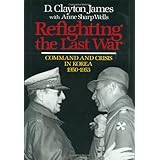
Average Reviews:

(More customer reviews)Are you looking to buy Refighting the Last War: Command and Crisis in Korea 1950-1953? Here is the right place to find the great deals. we can offer discounts of up to 90% on Refighting the Last War: Command and Crisis in Korea 1950-1953. Check out the link below:
>> Click Here to See Compare Prices and Get the Best Offers
Refighting the Last War: Command and Crisis in Korea 1950-1953 ReviewThis is a good text that highlights the (5)critical players and (6) command decisions that were part of the war.Truman left the details up to Acheson but felt the war, and especially prisoner repatriation, were moral imperatives. (The later cost Truman the election in '52...an armistice would have been signed before the election had Truman yielded). Ridgway, stabilizing the front after MacArthur's collapse, decided to extract maximum Chinese casualities for largely insignifcant terrain. Admiral Joy wore two hats as commander and negotiator. His minesweeping and Marine air support were often underappreciated, even as his worst fears about the Soviets in Vladivostok never materialized. On the other hand he often negotiated as much with his own State Department as with the communists. General Clark chafed under the restraints of limited war, and wound up signing the Armistice 'with a heavy heart.'
As an analyst the command decisions are more interesting.
***The decision to intervene showed the growing strength of the state department vis a vis military matters. It had been the Joint Chiefs ,after all, who had said a war on the Asian mainland should be avoided. But pressure of McCarthyism and fear of a Kremlin monolith pushed us in. For their part, the North Koreans assumed that the US machinery of declaring war would be too cumbersome for a timely response. While bypassing congress was justified under the urgent circumstances that late June of 1953, it was foolish not to engage and consult with key leaders as the war progressed.
***The author, as many do, gives a good description of the insurmountable logistics of the Inchon landing. Asked about its risks, MacArthur (perhaps sarcastically) commented that the real risk was putting US boys on the mainland in the first place. The author could have pointed out that 'donkeys' revealed the Flying Fish Channel was not mined, nor was the port heavily guarded. In any case, the momentum gained at Inchon was lost with the Wonsan landing on the east coast.
***With regards to the decision to cross the parallel, James points out that speeches and excitement about uniting Korea predated US force breakouts. But the success foundered as US forces outran their supplies in the west; the peninsula widened and the temperatures plummeted; the Taebek mountains prevented the 'pincers' from closing. As for the disaster of Chinese intervention, the author lays some blame on Truman. He used the Wake Island meeting with MacArthur largely for political grandstanding when it called for hardnosed geopolitical analysis.
***On the decision to fire MacArthur: Keep in mind MacArthur felt US policymakers placed too much emphasis on Europe. [Reviewers comment: we still do. Can you say BOSNIA?] His proposals to extend the war into Manchuria and China involved limited air and sea operations, not ground troops. [Clark made the same proposals 2 years later]. As for the advance itself, MacArthur took full advantage of what he felt were ambiguous orders. A final source of misunderstanding was simply that links between MacArthur, the JCS and presidential advisors (especially Acheson) were weak.
*** In his chapter 'Victory or Armistice' James deals well with arguments that we should have exploited the weak CCF instead of pursuing an Armistice in mid 1951. Should we have advanced to the Korean 'waist'-- the line between Wonsan and Pyongyang? Considering the difficulties we encountered later at the Iron Triangle and the Punchbowl, this might not have been as easy as we thought. True, Van Fleet and Admiral Joy felt we had fumbled an opportunity to 'crush the enemy'. But the author states frankly the American led alliance decided that 'if the blood of their young men' was to be shed further, it should be in areas more strategically critical. (of course this means, Europe.).
***Could the war have been fought in another way or by other means?? America never decided to use Chiang Kai Sheks forces; not only could this be provocative, but there was a feeling that they were not up to snuff, anyway. America sent its extra 4 divisions to Europe partly as a signal to the communists that we wish to keep the war confined to the Peninsula.
What about more of a sea war? Not only would a blockade of Manchuria have been ineffective, but it might have brought in the Russians from nearby Vladivostok. Shelling of Chinese cities and bases also would have been largely ineffective since many facilities were beyond the range of coastal gunfire.
Could the air war have been different? Strategic bombing had little impact on the defensive lines of the enemy. Atomic bombs were a charming threat, but overkill ; and ineffective in such rural terrain. [nuclear bombs are good for one and only one thing...blowing up large cities.] Hot pursuit of MiGs scooting back north of the Yalu was eventually allowed. (and effective: read No Kum Sok's book, A MiG15 to Freedom).
There were other limits and sanctuaries as well: UN bases in Korea (Pusan, for example) were never bombed; Russian air and naval support was never more than just adequate. These limits illustrate the complex, political nature of cold war warfare. If it was new to us then, it most certainly is not now. Have we learned from it??Refighting the Last War: Command and Crisis in Korea 1950-1953 Overview
Want to learn more information about Refighting the Last War: Command and Crisis in Korea 1950-1953?
>> Click Here to See All Customer Reviews & Ratings Now
0 comments:
Post a Comment